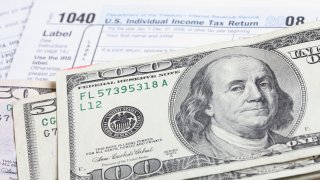
The 2022 Tax Deadline is almost here (it's later than usual this year), and the big question on many minds is a simple one.
When will you get your refund?
...And, how much will it be for?
Whether this is your first or fiftieth time filing taxes, you'll want to make sure you have all the correct information regarding your refund — after all, your tax refund is your own money that you worked hard for, and it was withheld from your paycheck. The government is simply giving it back to you.
Here's what you need to know about tax refunds this year—a few tax refund myths that have been debunked.
How Soon are Tax Refunds Issued?
According to the IRS, one out of 10 refunds is issued in less than 21 days.
Local
As of the week ending April 1, the IRS has sent out more than 63 million refunds worth over $204 billion.
What's the Average Tax Refund?
Feeling out of the loop? We'll catch you up on the Chicago news you need to know. Sign up for the weekly Chicago Catch-Up newsletter.
The average refund is $3,226, according to the IRS.
Can Anything Speed up the Tax Refund Process?
One commonly held myth is that calling the Internal Revenue Service or visiting an IRS office can speed up the refund process. According to the IRS, this is not true.
Nothing can speed up the process, but there are things that can help you avoid processing delays.
Paper filers should confirm the correct address for where to file on IRS.gov or on form instructions to avoid processing delays.
Note that processing paper tax returns could take much longer than usual. Taxpayers and tax professionals are encouraged to file electronically if possible
Filing electronically can help reduce mistakes. Make sure to enter information carefully, including any information needed to calculate credits and deductions.
Using tax software should help prevent math errors, but taxpayers should always review their tax return for accuracy.
How Can I Check the Status of my Tax Return?
The Illinois Department of Revenue said "in addition to free filing of Form IL-1040 through MyTax Illinois, individuals may also utilize the site to make payments, respond to department inquiries, and check the status of their refunds using the Where's My Refund? link."
Taxpaers can also calling the automated refund hotline at 1-800-829-1954.
"Where's My Refund?" can be used to check the status of a tax return within 24 hours after an e-file acceptance notification is received.
The “Where’s My Refund?” tool is updated only once every 24 hours. If it's been more than 21 days since a tax return was e-filed or more than six weeks since mailing a return, taxpayers can call a tax help hotline to talk to a representative.
What if I'm Still Awaiting my 2020 Tax Return?
The IRS says it "continues to make progress in this area and has taken numerous steps to help address this issue."
If you are still awaiting a 2020 tax return, you do not need to wait for it to be fully processed in order to file your 2021 taxes.
According to the IRS, those with unprocessed 2020 tax returns, should enter $0 (zero dollars) for last year's AGI on their 2021 tax return when electronically filing.
When Should I Adjust my Tax Withholding for 2022?
Every year, taxpayers should check their withholding and make adjustments accordingly. For instance, if you have experienced a life event like marriage or divorce, had a child or bought a new home, you should check your withholding.
Ideally, you want to have just enough withheld so your refund is as close to zero as possible, leaving you with more money each month to put into a savings account or invest.
Remember that you can make changes to your withholding at any time by filling out a W-4 with your employer. This form determines how much income tax is withheld from your paycheck.
If you’re not sure how much or how little you should withhold, the IRS has a tax withholding calculator on their website to help you determine the right amount.
How do I Know if I'm Eligible for the Earned Income Tax Credit?
Are you eligible for an earned income tax credit? If you weren't last year, that may have changed.
Under new guidelines, more people without children qualify to receive the federal Earned Income Tax Credit (EITC), the federal government's largest refundable tax credit for low- to moderate-income families, according to the Internal Revenue Service.
The tax claim could help taxpayers get an even bigger return, but according to the Illinois Department of Revenue, many Illinois residents are missing out.
The EITC and its Illinois counterpart, the Illinois Earned Income Credit (EIC), could bring bigger returns for eligible filers. But you'll need to claim it on your tax return in order to see the benefits.
In a change from past years, the federal credit is now available to more younger workers and senior citizens without children. To qualify, workers must be at least 19 years old and older than 64, according to the IRS. Previously, the credit for those with no dependents was only available for people age 25 to 64.
To find out if your family qualifies for the credit, click here.
How Do I Know If I'm Eligible For The Child Tax Credit?
Millions of Americans who have never filed a tax return will need to do so this year in order to claim what's coming to them under the enhanced child tax credit.
Previously, only people who earned enough money to owe income taxes could qualify for the full credit.
But as part of the $1.9 trillion coronavirus relief package, President Joe Biden expanded the program, increasing the payments to up to $3,600 annually for each child aged 5 or under and $3,000 for those who are ages 6 to 17.
The monthly payments have amounted to $300 for each child 5 and younger and $250 for those between 5 and 17.
The government began to send the payments out — an overall $93 billion — on a monthly basis starting last July. Now, there are an additional six months' worth of payments waiting to be claimed. And some families haven't collected any of the benefits they're due yet. In all, an estimated $193 billion is yet to be claimed.
The only way to receive that money is to file a tax return.
Here are some questions and answers about who's eligible for the credit and how to get it.
When is the 2022 Deadline to File Taxes?
While most Americans will have filed their taxes prior to Tax Day — which generally falls on April 15 — that isn’t the deadline for filing this year.
Instead, the vast majority of Americans will have to file their taxes by Monday, April 18.
The date change is due Emancipation Day, a holiday observed in Washington D.C. marking the freeing of slaves, that is celebrated on April 16.
Federal employees are given the day off, including at the Internal Revenue Service.
This year, April 16 falls on a Saturday, meaning that the nearest weekday is on the 15th of the month.
As a result, the deadline for tax filing is pushed forward to April 18.
How do I File for an Extension?
Taxpayers who cannot meet the April 18 deadline can easily request a six-month filing extension to Oct. 17 and prevent late filing penalties.
Use Free File or Form 4868. But keep in mind that, while an extension grants additional time to file, tax payments are still due April 18 for most taxpayers.
Who Do I Contact if I Have Questions?
The IDR said it plans to extend its phone hours on April 15 from 8 a.m. to 7 p.m. and on April 18 from 7:30 a.m. to 7 p.m. to help answer residents' questions.
For the most up-to-date information, forms, schedules, and instructions for the 2022 tax season, residents can check tax.illinois.gov.



